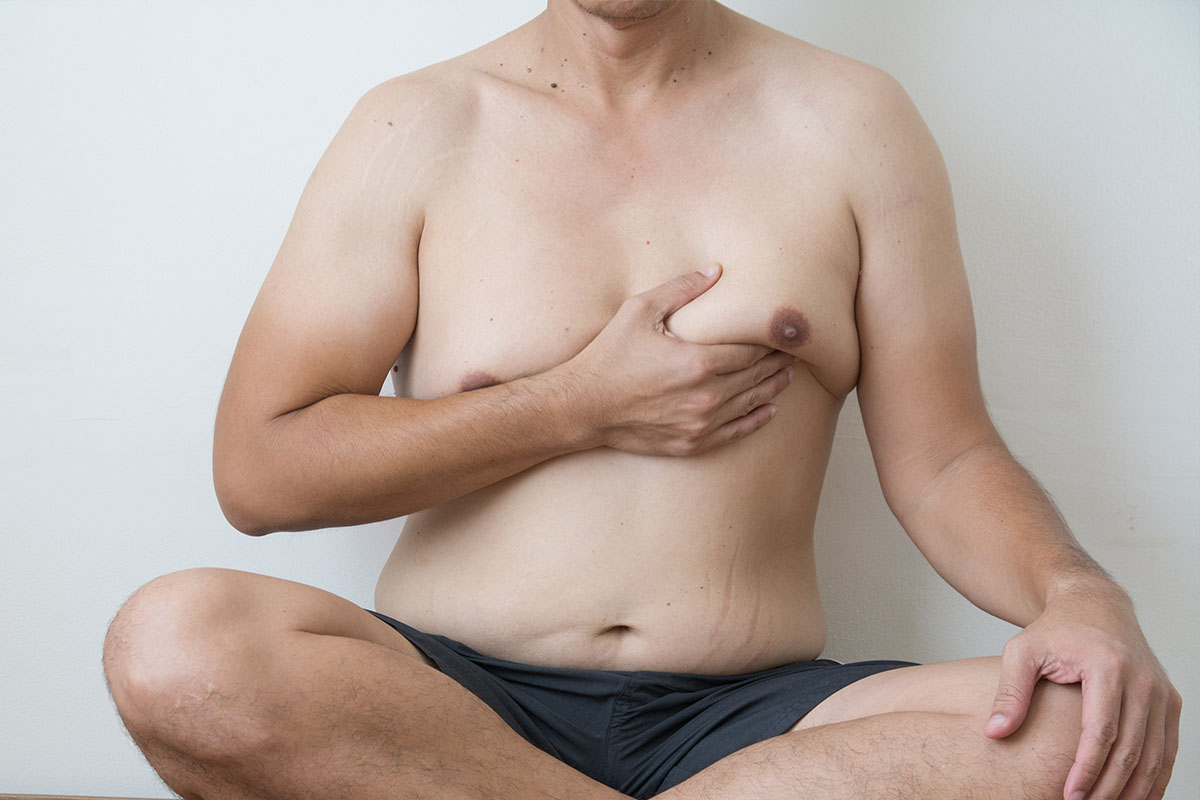
Tired of feeling self-conscious about your chest? If you’re dealing with man boobs, you’re not alone. Many men struggle with this issue, and the good news is that gynecomastia natural treatment options may help reduce its appearance—especially if the condition is caught early and managed proactively.
Whether you’re hoping to avoid plastic surgery or simply want to try every alternative first, there are practical steps you can take at home. In this guide, we’ll explore the most effective natural remedies and lifestyle changes that may help restore your confidence.
Can Gynecomastia Go Away Without Surgery?
In many cases, gynecomastia can improve on its own, especially when it’s caused by temporary hormonal imbalances or lifestyle factors. It’s important to distinguish between pseudogynecomastia—fatty deposits in the chest area—and true gynecomastia, which involves the growth of male breast tissue. Natural approaches may help reduce unwanted breast tissue in both cases, though results can vary based on the underlying cause. Identifying whether your condition is hormonal, drug-induced, or related to weight gain is key to determining the best course of action.
Natural Home Remedies for Gynecomastia Treatment
Before turning to surgery, many men find success through effective treatment strategies that focus on natural remedies and lifestyle changes. These non-surgical treatment options can play a key role in reducing the appearance of gynecomastia, especially in its early stages. Below, we’ll look at some practical, accessible approaches that may help you take control of your condition naturally.
Prepare a Proper Diet Plan
A proper, balanced diet plays a crucial role in managing gynecomastia naturally. Consuming nutrient-rich foods while cutting back on processed items can help regulate hormone levels and reduce overall body fat. For those struggling with excess chest fat, weight loss through dietary adjustments may significantly improve the appearance of the chest area. Focus on whole grains, lean proteins, healthy fats, and antioxidant-rich vegetables to support your metabolism and promote hormonal balance.
Strength Exercise and Cardio
Exercise is a powerful tool in reducing the appearance of gynecomastia. Incorporating both strength training and cardio into your routine helps burn body fat, which is often linked to higher estrogen levels—one of the key hormonal imbalances behind this condition. Building up the pectoral muscles through exercises like push-ups, bench presses, and chest flys can also give the chest a more sculpted appearance. Combined with cardiovascular workouts, this approach supports hormonal regulation and overall fat reduction.
Turmeric and Milk Thistle
Turmeric and milk thistle are two powerful herbs that have been studied for their role in supporting hormone balance and liver function. These natural treatments are believed to aid in the reduction of estrogen levels while promoting testosterone production, which is essential in addressing the hormonal roots of gynecomastia. Turmeric contains curcumin, known for its anti-inflammatory properties, while milk thistle supports detoxification processes that may indirectly boost the hormone testosterone. When combined with other lifestyle changes, these herbs can enhance your body’s ability to regulate hormone levels naturally.
Other Natural Supplements
In addition to herbal remedies, certain vitamins and nutrients have shown potential in supporting hormone regulation and reducing gynecomastia symptoms. Supplements such as zinc, vitamin D, vitamin B6, and omega-3 fatty acids can aid in balancing estrogen and testosterone levels. These nutrients contribute to better metabolic function, support the endocrine system, and may help reduce excess fat that contributes to the condition. Before starting any supplement regimen, it’s best to consult with a healthcare provider to ensure it’s appropriate for your individual needs.
Manage Your Stress Levels
Chronic stress can disrupt hormonal balance and indirectly contribute to the development or persistence of gynecomastia. Elevated cortisol levels may suppress testosterone, further tipping the hormonal scale in favor of estrogen. Practicing stress management techniques—such as meditation, deep breathing exercises, regular physical activity, and adequate sleep—can help restore hormonal harmony. Reducing stress not only supports overall health but also complements other natural approaches to treating gynecomastia.


SPECIALIST CARE YOU CAN TRUST
Dr. Salloum is supported by a brilliant team of caring staff members.
You can trust the entire staff to help make your visit as comfortable and safe as possible!
What to Avoid for Reducing Gynecomastia
Just as certain habits and treatments can help alleviate gynecomastia, others can contribute to its persistence or worsening. Avoiding specific substances and behaviors that lead to an increase in estrogen production is essential for maintaining balanced hormone levels. In this section, we’ll highlight common culprits that may negatively affect your progress and should be limited or eliminated for best results.
Phytoestrogens Intake
Phytoestrogens are naturally occurring plant compounds that mimic the effects of estrogen in the body. While not harmful in small amounts, excessive consumption may contribute to hormonal imbalances and worsen gynecomastia symptoms. These compounds are commonly found in foods like soy products, flaxseeds, chickpeas, lentils, and even green tea. Limiting your intake of these items—especially if consumed frequently—can help reduce the risk of heightened estrogen activity and support more balanced hormone levels overall.
Anabolic Steroids
The use of anabolic steroids is a major contributor to hormonal imbalance in men, often resulting in the development of gynecomastia. These synthetic substances can significantly disrupt the body’s natural hormone production, leading to elevated estrogen levels. This hormonal shift may cause the buildup of unwanted fat around the chest, masking the underlying chest muscles and worsening the condition. Avoiding anabolic steroids is crucial for protecting your hormonal health and preventing the progression of gynecomastia.
Alcohol, Especially Beer
Excessive alcohol consumption, particularly beer, can negatively affect hormone balance and contribute to the development of gynecomastia. Beer contains phytoestrogens from hops, which may increase estrogen levels when consumed in large amounts. Additionally, chronic alcohol use can impair liver function, making it harder for the body to metabolize and eliminate excess estrogen. Cutting back on alcohol—especially beer—can support hormone regulation and reduce the risk of worsening gynecomastia symptoms.
Certain Medications
Some medications are known to cause hormonal changes that may lead to gynecomastia as a side effect. Drugs such as anti-androgens, antidepressants, heart medications, and even some antibiotics have been linked to disruptions in hormone levels. These hormonal shifts can increase estrogen activity or decrease testosterone, contributing to the development of male breast tissue. If you suspect your medication may be affecting your hormones, consult with your healthcare provider to explore alternative options that are less likely to impact your endocrine system.
Phthalates (Plastics)
Phthalates are chemical compounds commonly found in plastic products such as food packaging, containers, water bottles, and personal care items. These substances are known endocrine disruptors and have been linked to hormonal imbalances, including increased estrogen activity in the body. Long-term exposure to phthalates may interfere with testosterone production and contribute to the development or worsening of gynecomastia. Reducing your contact with plastics—especially when heating or storing food—can help support healthier hormone levels and overall well-being.
Important Considerations of Gynecomastia
Not all cases of gynecomastia respond equally to natural treatments. The effectiveness of these methods often depends on the causes of gynecomastia, such as hormonal imbalances, medication use, or underlying health conditions. In situations where the condition is due to stubborn excess breast tissue or long-standing hormonal shifts, natural remedies alone may not provide sufficient results.
For individuals who have not seen improvement through lifestyle changes, supplements, or exercise, surgical options may be the most reliable path forward. Gynecomastia surgery can effectively remove glandular tissue and reshape the chest for a more masculine contour. It’s important to set realistic expectations based on your specific situation and to consult with a qualified medical professional to determine the best treatment plan for your needs.
Consult with an Expert Gynecomastia Doctor
While natural methods can help in mild to moderate cases, persistent or severe gynecomastia often requires professional care. It’s important to consult with a board-certified surgeon to evaluate whether cosmetic surgery may be the most effective path forward. A tailored treatment plan ensures your health, safety, and confidence are prioritized.
At the Miami Center for Plastic Surgery, Dr. Gabe Salloum specializes in male breast reduction and understands the emotional and physical impact of this condition. With years of experience treating the appearance of gynecomastia, Dr. Salloum offers compassionate, expert care to help you look and feel your best. Call us at 305-405-6910 or visit our contact page to schedule your private consultation.